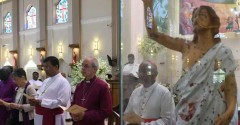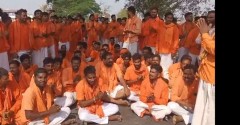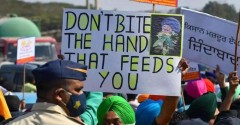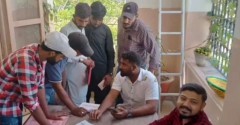
NEWSLETTERS
What’s happening in Asian Church
and what does it mean for the
rest of the world?
Updated: September 15, 2021 10:59 AM GMT
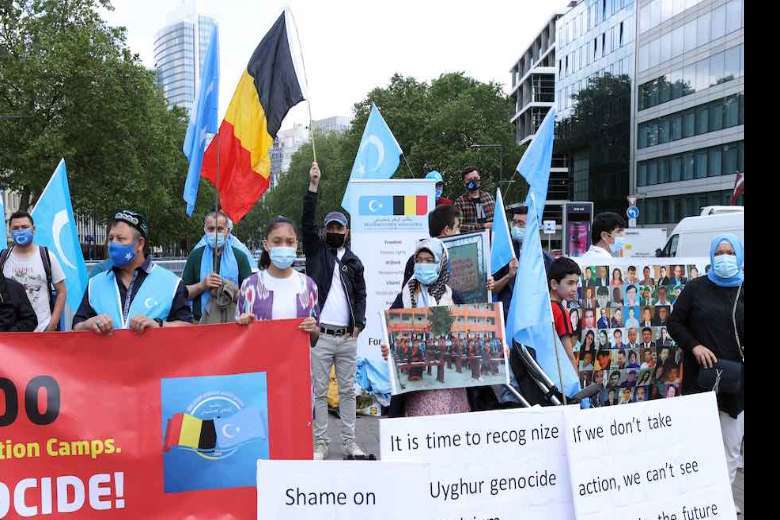
The most comprehensive, complex and potentially consequential inquiry into the persecution of the Uyghurs – the Uyghur Tribunal – concluded on Monday. After eight days of public hearings in London in June and September in which the tribunal heard from over 70 witnesses and – according to Counsel to the Tribunal Hamid Sabi – after over 30 researchers spent over 10,000 hours reviewing hundreds of thousands of pages of documents, including 500 fact witness statements – we now await the Tribunal’s judgment, due on 9 December.
Whatever the Tribunal’s judgment on the question at hand – whether the persecution of the Uyghurs can be determined as genocide – this exercise itself is truly remarkable, for many reasons and four in particular.Firstly, the database of evidence that has been compiled maybe, as Mr. Sabi said in his summary yesterday, be one of the most complete databases on this issue. That in itself is an achievement, as it will serve policy-makers, historians and perhaps prosecutors in coming years well. Even if the perpetrators of the grave atrocity crimes alleged are never brought to justice, the history of the persecution of the Uyghurs will be told with greater accuracy. Secondly, almost all of this work was done, in the words of the Tribunal chair Sir Geoffrey Nice, QC – the British barrister who prosecuted Slobodan Milosevic – pro bono publico. Apart from some of the most junior lawyers and researchers in the team who received a modest fee because they need to earn a living, no one involved received any remuneration. They undertook this work in the public interest.Thirdly, it drew extraordinary wrath from the Chinese Communist Party regime in Beijing. Before the hearings in June, the regime called a press conference, in which they denounced Sir Geoffrey Nice, absurdly, as “a notorious human rights abuser and a British spy” and claimed that all witnesses were paid actors giving fake evidence.To the men in suits in Beijing, let me simply say this: I’ve known Sir Geoffrey for well over a decade, and have sat in his car as he drove through the streets of Dubrovnik. From his driving skills and his generosity of spirit I can assure you he ain’t no 007, and the charge of ‘human rights abuser’ is so laughable as to not merit a response. I guess Xi Jinping wouldn’t know “pro bono publico” if it hit him in the eye.But not only has Beijing’s anger been rhetorical. The Uyghur Tribunal as an entity and Sir Geoffrey as an individual were among those British public figures and entities sanctioned by the Chinese regime, in petty retaliation for the United Kingdom’s handful of sanctions against some of Xinjiang officials and institutions regarded as responsible for the repression of the Uyghurs.And last week it emerged that the new Chinese Ambassador to London, Zheng Zeguang, threatened the British government over the Uyghur Tribunal, and took part in Beijing’s latest press conference denouncing the Tribunal.The Tribunal has written to the People’s Republic of China multiple times inviting them to submit their case. In response to this latest tantrum by Beijing, the Tribunal wrote reiterating their invitation. At no point has this invitation been taken up.So the key question, therefore, is: what does Beijing have to hide? It tries to threaten, bully, intimidate, defame, insult, harass and sanction the Tribunal into silence – and worse, threaten witnesses. It parades relatives of witnesses, as it did in June, on television, forcing them to denounce their loved ones giving evidence. And it refuses multiple invitations to provide any evidence to support its case. The only conclusion to make from this is that the top echelon of the Chinese Communist Party knows that they’re about to be caught with blood on their hands, they are freaking out and they’re desperate to eliminate the truth at all costs.That leads to the fourth key point: evidence published on Tuesday by Uyghur expert Adrian Zenz, directly linking Xi Jinping and the senior leadership of the Chinese Communist Party regime to the intensification of repression of the Uyghurs.Of course, anyone who knows anything about China would know that prison camps, systematic and very severe torture, forced sterilization, forced abortions, religious persecution and intense surveillance could not occur without Beijing’s say-so, especially after the news got out to the outside world. If Xi and the Chinese regime’s top-brass wanted to reverse, relax or stop the repression of the Uyghurs at any point, they could have given the order. So their complicity was already a given.But now Dr. Zenz has uncovered documents that directly link the senior leadership to direct orders to do the opposite – and as the final witness in the Tribunal, he presented that in a powerful way. Many thought Chen Quangguo, former Chinese Communist Party Secretary in Tibet known for his enthusiasm for turning the screw, was the “pioneer” of Xinjiang’s concentration camps. But it seems from Dr. Zenz’s research, he was just the implementor of instructions that came from the top.I do not want to prejudge the Uyghur Tribunal’s conclusions. And so all I will say at this stage is this: Study the hours of oral and written testimony presented to the Tribunal and publicly available on its website.Ask yourself the question: why would the Chinese Communist Party regime go so berserk, refuse to engage and sanction the independent Tribunal, if it had nothing to hide? So what’s it hiding?And ask what we should demand of our governments in response? Should we be trading with a regime that commits the atrocities alleged in this tribunal? Or should we be seeking to ensure that our supply chains aren’t built on slave labor, that our trading relations aren’t made with the perpetrators of genocide, that Olympic Games aren’t hosted by those who commit genocide and that those who commit such crimes are brought to account?In early 2019, I met some Uyghurs who came to London. One of them told me: “People don’t even have the freedom to breathe.”I introduced them to Sir Geoffrey. We asked the question: could we hold an independent people’s tribunal? I never imagined that a tiny seed could blossom into the flower we see today. Let us hope that this exercise might lead to justice, one day, for the Uyghurs, and for everyone persecuted by the brutal Chinese Communist Party regime.










